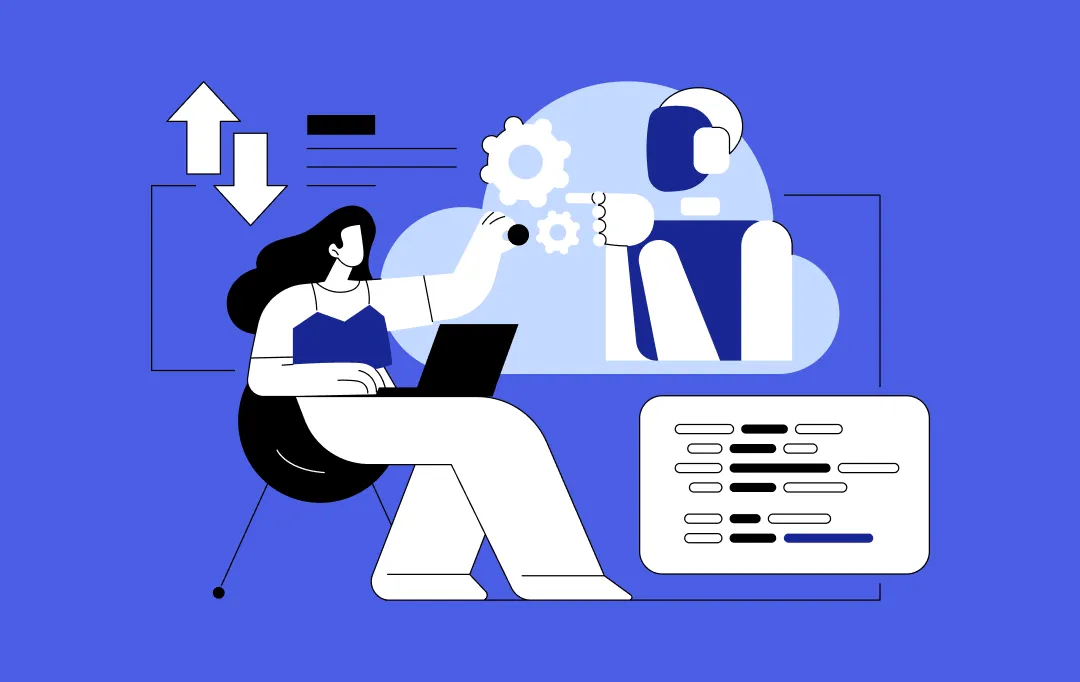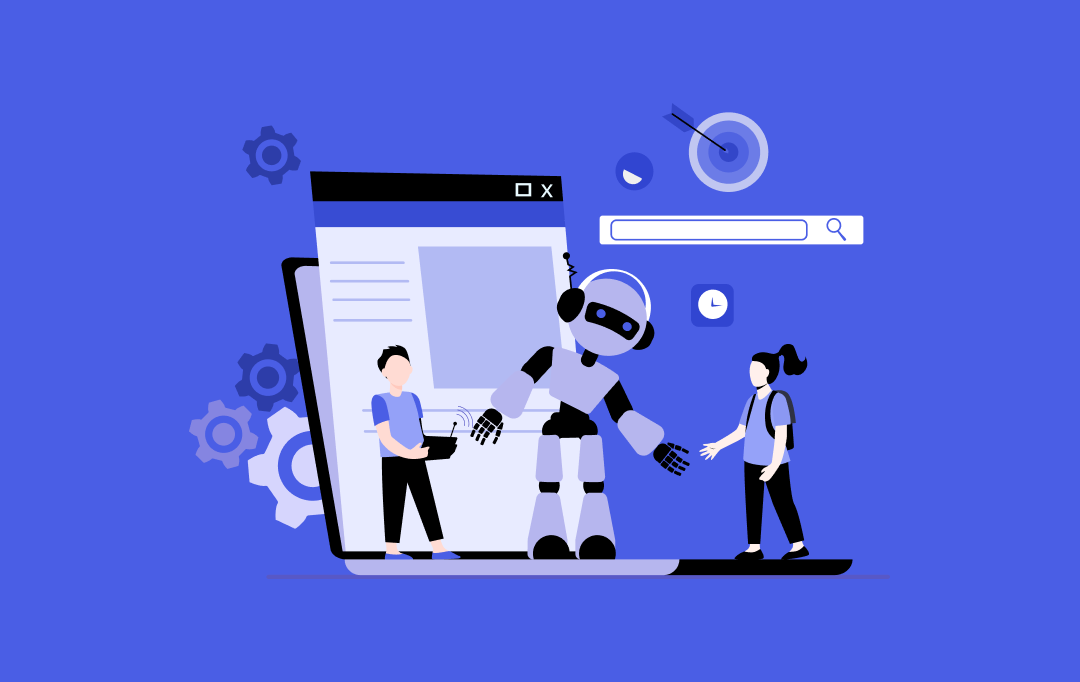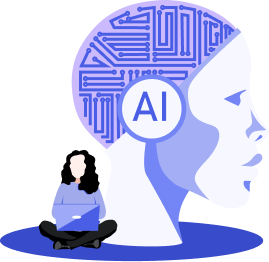- Why is AIaaS Essential for Businesses Today and Why Now is the Right Time to Invest?
- Practical Applications of AIaaS for Businesses
- 1. Automating Routine Tasks
- 2. Predictive Analytics for Smarter Decision-Making
- 3. Personalized Customer Experiences
- 4. Real-Time Customer Support with Chatbots
- 5. Fraud Detection and Risk Management
- 6. Intelligent Document Processing
- 7. Enhancing Healthcare Outcomes with AI Diagnostics
- 8. Optimizing Supply Chains
- How Different Industries Are Using AI as a Service: A Glimpse into the Leading Brand Leveraging AIaaS
- How to Implement AIaaS in Your Business: A Step-by-Step Guide
- 1. Assess Your Business Needs and Goals
- 2. Choose the Right AIaaS Provider
- 3. Start with a Pilot Project
- 4. Integrate AIaaS with Existing Systems
- 5. Train Your Team
- 6. Monitor and Optimize
- 7. Scale and Expand
- Measuring the Success of AIaaS Implementation and Tracking ROI
- 1. Define Key Performance Indicators (KPIs)
- 2. Monitor Real-Time Data
- 3. Conduct Regular Performance Reviews
- 4. Calculate ROI
- 5. Collect Customer and Employee Feedback
- 6. Compare Pre- and Post-AI Performance
- 7. Evaluate Long-Term Scalability
- AI as a Service (AIaaS) Business Model: How Enterprises Create Value at Scale
- AI as a Service Business Model: How Enterprises Create Value with AIaaS
- AIaaS Pricing Models Enterprises Commonly Use
- How Enterprises Generate ROI with AIaaS
- AIaaS vs Traditional AI Development (Business Model Comparison)
- When AIaaS Is the Right Business Model for You
- Executive Lens: AIaaS as an Operating Model (Pointer-Only)
- Challenges of Implementing AIaaS and How to Overcome Them
- 1. Data Quality and Integration
- 2. Resistance to Change
- 3. Cost and Budgeting
- 4. Security and Compliance
- 5. Lack of In-House Expertise
- 6. Scalability Challenges
- Emerging Trends in AIaaS: What’s Next for Businesses?
- 1. Increased Adoption of AIaaS in Small and Medium Enterprises (SMEs)
- 2. AIaaS for Enhanced Personalization and Customer Experience
- 3. Integration with Edge Computing
- 4. AIaaS for Predictive Maintenance and Risk Management
- 5. AIaaS for Ethical AI and Bias Mitigation
- 6. Conversational AI and Natural Language Processing (NLP) Advancements
- 7. AIaaS and Automation for Data-Driven Decision-Making
- 8. AIaaS in Healthcare Innovation
- Why Choose Appinventiv as Your AIaaS Development Partner
- FAQs
Key takeaways:
- AIaaS enables fast, infrastructure-free AI adoption.
- Used across industries for automation and insights.
- Real-world examples show proven business impact.
- Pilot-first approach ensures smooth implementation.
- Key challenges include data, cost, and scaling.
- Trends include ethical AI, edge, and SME growth
Imagine being able to cut down your operational costs while simultaneously improving decision-making and customer experiences. Sounds too good to be true? Well, it’s not. Businesses across industries are already using AI as a Service (AIaaS) to do exactly that.
From automating tedious tasks to delivering real-time insights, AIaaS is providing businesses with immediate, tangible results. No more waiting months for software to be developed or investing in expensive in-house infrastructure—AIaaS is already up and running, helping companies solve real business problems right now.
Think about it: What if you could access AI capabilities that are as easy to integrate as flipping a switch? What if AI could handle the repetitive, mundane tasks that drain your team’s energy, freeing them up to focus on what really matters? And, on top of that, what if it gave you data-driven insights that improve your decision-making in real-time? This isn’t some distant dream. It’s happening now—and businesses that aren’t jumping on board are already falling behind.
This blog will dive into the practical applications of AIaaS, showcasing how businesses are using this technology to enhance efficiency, reduce associated costs, and drive growth. Whether you’re in healthcare, retail, or finance, artificial intelligence as a service is helping businesses unlock new opportunities and stay competitive without the usual roadblocks. Let’s break down how it works, why now is the right time to embrace it, and how you can start seeing results immediately.
We can help you unlock AIaaS’ full potential!
Why is AIaaS Essential for Businesses Today and Why Now is the Right Time to Invest?
Businesses right now find themselves facing a pretty stark choice—stick with those clunky, outdated systems that drain both time and money, or jump on board with AI as a service for business, which has quickly become the backbone of how modern companies actually get things done. The decision is getting easier to make every single day, and here’s the thing: AIaaS isn’t some sci-fi pipe dream anymore—it’s something you absolutely need to stay competitive.
McKinsey dropped some eye-opening numbers in their 2025 “The State of AI” report, showing that 78% of organizations have already woven AI into at least one part of their business operations. That’s a massive leap from where things stood just a few years back. This surge in adoption really drives home how companies are waking up to AI’s potential as a genuine business game-changer. AIaaS sits right at the heart of this transformation, delivering AI solutions that are easy to access, can scale with your needs, and won’t break the bank—all without forcing you to build massive tech infrastructure from scratch.
PwC’s “AI Predictions for 2025” report backs this up, pointing out that AI has evolved into something companies can’t afford to ignore if they want real results, especially when it comes to making smarter decisions and running tighter operations. That’s exactly why so many businesses are partnering with AIaaS providers—they get access to cutting-edge AI capabilities without getting bogged down in the technical complexity or massive costs that come with building everything in-house.
Here’s what’s really happening: businesses using AI as a Service aren’t just keeping their heads above water—they’re absolutely crushing it. If you’re still sitting on the sidelines, waiting to see what AI can really do for your operations, there’s a good chance you’re already falling behind. The time for watching your competitors pull ahead is over. You need to start positioning your business for long-term success right now.
Practical Applications of AIaaS for Businesses
AI as a Service (AIaaS) is helping businesses solve problems, increase efficiency, and stay competitive in real time. From automating manual tasks to delivering actionable insights, let’s look into practical AI as a Service business applications that are transforming operations across the globe:
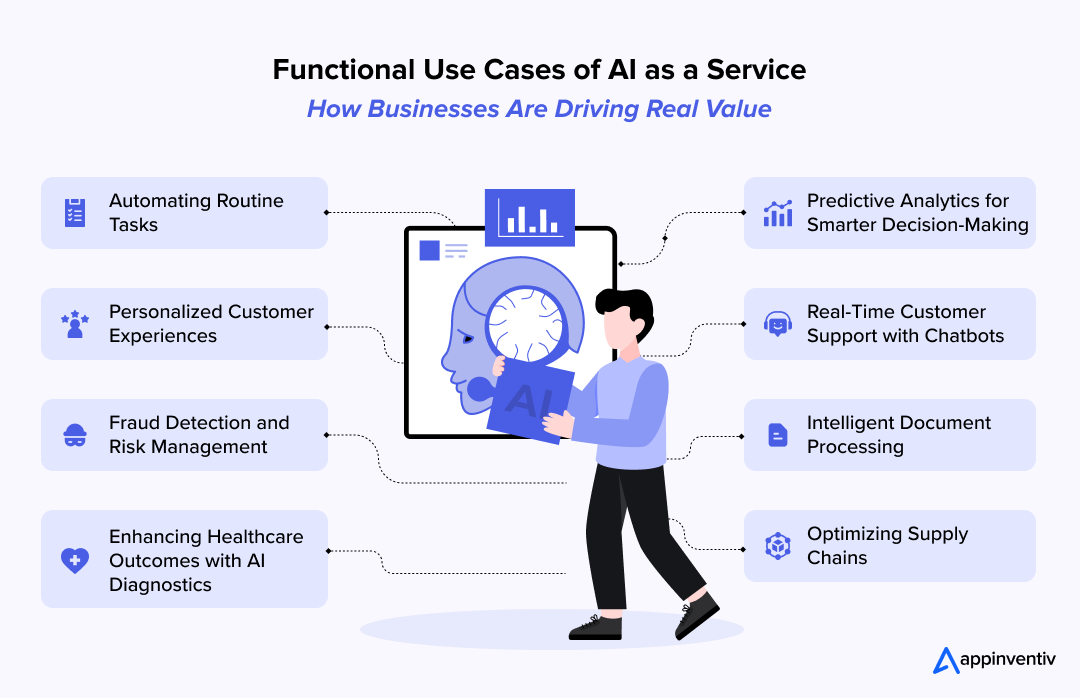
1. Automating Routine Tasks
AIaaS streamlines repetitive, labor-intensive processes like data entry, invoice handling, and appointment scheduling. When organizations delegate these routine operations to AI systems, they free up significant time and resources. This shift lets staff members concentrate on strategic initiatives that deliver greater business value.
2. Predictive Analytics for Smarter Decision-Making
Through AIaaS for business decision-making, companies harness data-driven insights to make informed choices. From sales projections and stock management to understanding customer patterns, predictive analytics backed by AI keeps organizations competitive and forward-thinking.
3. Personalized Customer Experiences
AIaaS empowers companies to craft customized interactions for their clients using purchase records, behavioral data, and individual preferences. When businesses implement AI-powered recommendation systems and targeted marketing approaches, they boost customer involvement and generate more revenue.
4. Real-Time Customer Support with Chatbots
Chatbots driven by AIaaS deliver round-the-clock customer assistance, addressing inquiries, solving issues, and walking clients through different procedures. This approach improves the overall customer journey while lightening the workload for human support staff.
5. Fraud Detection and Risk Management
Artificial intelligence as a service excels at examining financial transactions, spotting irregular behaviors, and catching fraudulent activity as it happens. Through machine learning algorithms, AI systems constantly enhance their ability to detect suspicious patterns, giving companies a strong shield against monetary crimes.
6. Intelligent Document Processing
AI as a Service handles the automated extraction of critical data from paperwork such as contracts, billing statements, and patient files. Using natural language processing (NLP) technology, organizations can improve their document workflows and minimize manual oversight requirements.
7. Enhancing Healthcare Outcomes with AI Diagnostics
AIaaS supports medical professionals in identifying health conditions through the analysis of extensive data collections and cross-referencing with historical patient information. This technology helps physicians deliver more precise and timely diagnoses, leading to better patient care.
8. Optimizing Supply Chains
AIaaS enables companies to refine their supply chain operations through delay predictions, route optimization, and enhanced demand planning. These improvements lead to reduced costs, smoother operations, and quicker product delivery schedules.
While AIaaS offers powerful capabilities for businesses in any sector, its applications vary across industries. Let’s move ahead and look at the AIaaS use cases tailored to specific industries, highlighting how different sectors are leveraging this technology for transformation.
How Different Industries Are Using AI as a Service: A Glimpse into the Leading Brand Leveraging AIaaS
AIaaS has emerged as a transformative force that’s reshaping how different industries operate. When companies customize AI solutions to match their unique business requirements, they’re able to make their operations run smoother, create better experiences for their customers, and spark real innovation. Let’s dive into the specific business applications of AI as a service and see how they’re making a difference:
| Industry | AIaaS Use Case | How It’s Applied | Real Example |
|---|---|---|---|
| Healthcare | AI Diagnostics and Predictive Analytics | Analyzes medical records, imaging, and patient data to assist in diagnosis and treatment plans. | Pfizer uses AWS AIaaS for drug research |
| Retail | Personalized Customer Experiences | Uses ML models to recommend products, forecast demand, and automate marketing. | Macy’s uses Google Cloud AIaaS |
| Finance | Fraud Detection and Risk Management | Processes transaction data in real time to detect anomalies and fraud patterns. | American Express uses Azure AIaaS |
| Manufacturing | Predictive Maintenance | Predicts equipment failure and optimizes production using data and AI models. | Schneider Electric uses IBM Watson AIaaS |
| E-commerce | Recommendations and Chatbots | Leverages NLP and recommendation engines to improve customer engagement. | eBay uses Google Cloud AIaaS |
| Education | Adaptive Learning and Analytics | Customizes learning paths using student data and behavior. | Carnegie Learning uses AWS AIaaS |
| Logistics | Route Optimization | Improves delivery times and reduces fuel usage using AI to analyze traffic and weather. | UPS uses Google Cloud AIaaS |
| Insurance | Automated Claims Processing | Automates review and approval of claims through AI-powered document and image recognition. | USAA uses AWS Textract & AIaaS tools |
| Telecom | Network Optimization and Support Automation | Analyzes network logs and automates helpdesk responses to improve uptime. | Telenor uses Microsoft Azure AIaaS |
| Energy | Smart Grid Management and Demand Forecasting | Uses AI to balance energy loads and forecast future consumption. | Exelon uses IBM Watson AIaaS |
| Travel & Hospitality | Customer Service and Dynamic Pricing | AIaaS powers chatbot support and adjusts pricing in real-time based on demand and patterns. | KLM Royal Dutch Airlines uses IBM AIaaS |
| Real Estate | Price Estimation and Investment Insights | AIaaS predicts property value fluctuations and provides insights for investors. | Redfin uses Azure AIaaS |
| Media & Entertainment | Content Tagging and Audience Analytics | AIaaS helps classify content, recommend media, and predict viewer behavior. | ViacomCBS uses AWS Rekognition AIaaS |
| Automotive | Predictive Maintenance and Driver Behavior | Uses AIaaS for connected car analytics, maintenance alerts, and behavior tracking. | Toyota uses Azure AIaaS |
After looking into the multiple real-world applications of AI as a service for business as well as AI as a service examples, let us move ahead and understand how to implement AIaaS in your business operations.
Whether you’re in healthcare, retail, or finance, our expert services can drive your business forward.
How to Implement AIaaS in Your Business: A Step-by-Step Guide
Implementing AIaaS in your business doesn’t have to be a daunting process. With the right approach, AI solutions can be seamlessly integrated into your existing systems and start delivering value right away. Here’s a step-by-step guide to help you navigate the implementation of AIaaS and unlock its potential for your business:
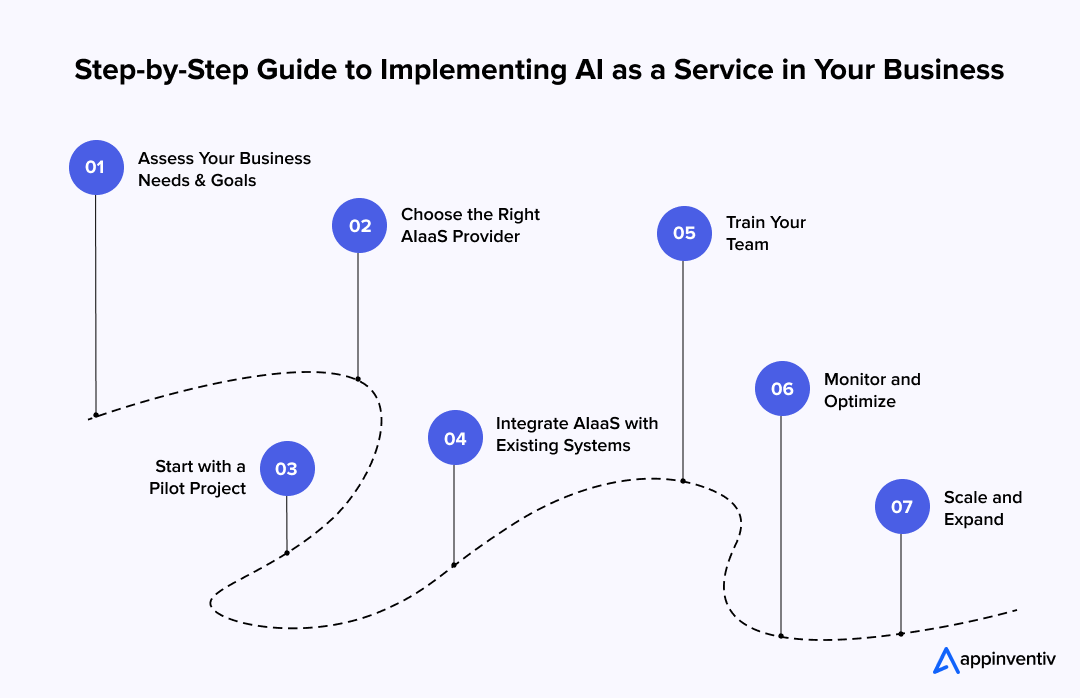
1. Assess Your Business Needs and Goals
Before diving headfirst into AI as a Service, you need to figure out which parts of your business will actually get the biggest boost from AI. Maybe you’re trying to streamline operations, give your customer service a makeover, or just make better decisions overall? Getting clear on this upfront helps you zero in on the AI solutions that’ll pack the biggest punch.
Action Step: Conduct an internal assessment to pinpoint operational bottlenecks or areas with high manual effort that could benefit from automation or predictive analytics.
2. Choose the Right AIaaS Provider
The AIaaS market is packed with providers offering all sorts of solutions, so picking the right one matters big time. You want someone who can tailor their offerings to what you actually need, plus they should have your back with solid support. Don’t forget to weigh things like how well they can scale with you, their security game, and whether they really know your industry.
Action Step: Research AI as a service company based on your business requirements, and ensure they have a track record of success in your industry.
3. Start with a Pilot Project
Instead of going all-in and deploying artificial intelligence as a service everywhere at once, pick a small, focused pilot project first. This way, you can test drive the AI tools in a safe space, see what kind of impact they have, and spot any hiccups before you go bigger.
Action Step: Choose a small, high-impact project to implement AIaaS. For example, automate customer service responses or use predictive analytics to forecast sales for a specific product line.
4. Integrate AIaaS with Existing Systems
Your AIaaS solution should play nice with what you already have running. Making sure everything connects smoothly with your current software and databases is absolutely critical. The good news is most AIaaS providers have integration tools that make linking up with your systems pretty straightforward, without throwing your daily operations into chaos.
Action Step: Work closely with your AIaaS provider to ensure seamless integration with your CRM, ERP, or any other relevant systems in use.
5. Train Your Team
AI might be incredibly powerful, but it’s basically useless if your people don’t know how to work with it. Put some real effort into training sessions so your employees can get comfortable with AI-powered tools, understand the new workflows, and actually use the insights AI generates to make smarter calls.
Action Step: Organize training sessions for key teams (e.g., customer service, marketing, and IT) to ensure they’re equipped to use AIaaS effectively.
6. Monitor and Optimize
Once you’ve got your pilot project up and running, keeping an eye on how it’s performing becomes crucial. AIaaS is essentially a learning system that gets better with time, but you need to stay on top of optimizing it to squeeze out every bit of ROI. Watch the results, listen to feedback, and tweak things as you go.
Action Step: Track KPIs such as cost savings, efficiency improvements, and customer satisfaction to gauge the success of the AIaaS implementation.
7. Scale and Expand
After your pilot project proves its worth, that’s your green light to scale up. One of the best things about AIaaS is how it can grow right alongside your business, so don’t waste that opportunity. Start bringing more sophisticated AI tools into other areas where they can really make a difference.
Action Step: Once your pilot is successful, expand the use of AIaaS to other business functions, such as predictive maintenance in manufacturing or personalized marketing in retail.
Measuring the Success of AIaaS Implementation and Tracking ROI
After implementing AI as a Service, it’s crucial to track its performance to ensure it’s delivering the expected results. Here’s a simplified approach to measuring AIaaS success and tracking ROI:
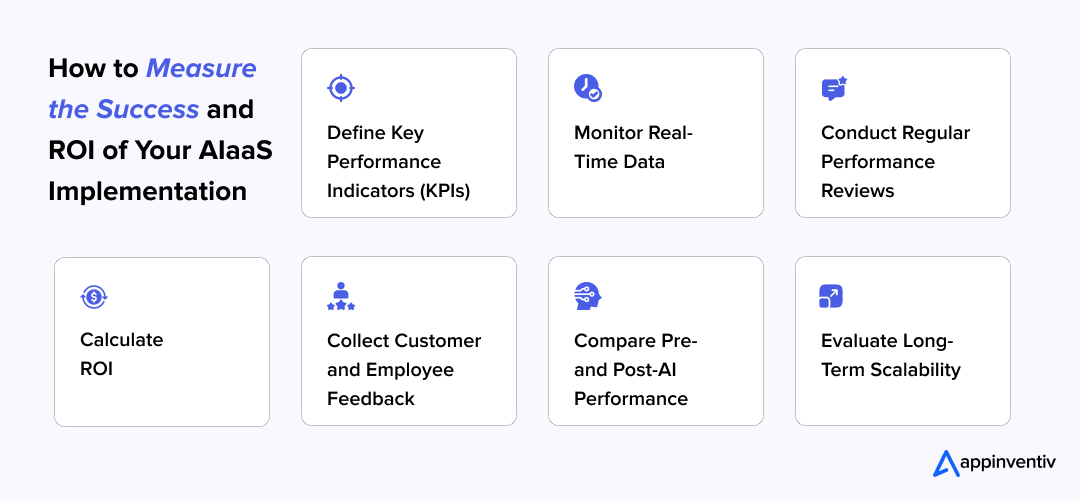 1. Define Key Performance Indicators (KPIs)
1. Define Key Performance Indicators (KPIs)
You’ll want to start by figuring out which metrics actually matter for what you’re trying to achieve—things like how much money you’re saving, the time you’re getting back, whether customers are happier, and if your revenue is climbing. These KPIs become your measuring stick for whether things are actually working.
2. Monitor Real-Time Data
Take advantage of those reporting tools your AIaaS provider gives you to keep tabs on how everything’s performing. Keep a close eye on stuff like how quickly your customer service team responds, what your sales numbers look like, or how well you’re managing inventory to see where AI is making the biggest difference.
3. Conduct Regular Performance Reviews
Set up regular check-ins on how your artificial intelligence as a service is doing—maybe every quarter or twice a year works best for you. These reviews help you spot where things might be falling short, make sure you’re hitting your targets, and fine-tune everything to get better results.
4. Calculate ROI
Figure out your return on investment by stacking up what you’re gaining from AIaaS (like the money you’re saving and extra revenue coming in) against what you’re spending on it. The math is pretty straightforward: ROI = (Gains – Costs) / Costs * 100. This gives you the real story about whether it’s paying off financially.
5. Collect Customer and Employee Feedback
Don’t forget to actually ask your customers and employees what they think about how AIaaS is changing their day-to-day experience. Are your customers getting help faster? Are your people spending way less time on boring, repetitive stuff? This kind of feedback tells you things the numbers might miss.
6. Compare Pre- and Post-AI Performance
Take a hard look at your key numbers from before you brought in AIaaS and compare them to what you’re seeing now. Look at things like what operations are costing you, how satisfied your customers are, and your overall sales to get a clear picture of the changes AI has driven.
7. Evaluate Long-Term Scalability
One of the best things about AIaaS is that it’s built to grow right along with your business. Make it a habit to check how well the system handles your changing needs as you expand. Ask yourself whether AIaaS is actually helping you grow your operations or break into new markets more smoothly than you could before.
AI as a Service (AIaaS) Business Model: How Enterprises Create Value at Scale
AI as a Service (AIaaS) is a consumption-based AI operating model where enterprises access AI capabilities through cloud platforms instead of building and maintaining AI infrastructure in-house.
Rather than owning models, hardware, and ML teams, businesses consume AI as an on-demand service, similar to SaaS, but optimized for data, intelligence, and automation.
AI as a Service Business Model: How Enterprises Create Value with AIaaS
Core structure:
- Cloud-hosted AI models and platforms
- Pay-as-you-use or subscription-based pricing
- Scalable compute and inference
- Continuous model updates and optimization
Enterprise advantage:
AI shifts from a capital expenditure (CapEx) to a controlled operating expense (OpEx).
AIaaS Pricing Models Enterprises Commonly Use
1. Usage-Based Pricing
Pay per API call, inference, or compute unit
Ideal for variable workloads and pilots
2. Subscription-Based Pricing
Fixed monthly or annual cost
Predictable budgeting for production systems
3. Tiered Enterprise Plans
Volume discounts
Dedicated SLAs, security controls, and compliance support
Decision insight:
Most enterprises start with usage-based pricing and move to hybrid or subscription models once ROI is proven.
How Enterprises Generate ROI with AIaaS
Primary value drivers:
- Reduced infrastructure and hiring costs
- Faster deployment of AI use cases
- Lower risk compared to in-house AI builds
- Ability to scale AI across departments
Common ROI outcomes:
- 20–40% reduction in operational costs
- Weeks (not months) to deploy AI solutions
- Improved decision accuracy through real-time insights
AIaaS vs Traditional AI Development (Business Model Comparison)
AIaaS Model
Low upfront investment
Faster time-to-value
Scales with demand
Vendor-managed infrastructure and updates
In-House AI Model
High initial cost
Long development cycles
Requires specialized talent
Higher governance and maintenance burden
Executive takeaway:
AIaaS is better suited for speed, scale, and risk-managed adoption, while in-house AI fits only highly specialized, long-term R&D use cases.
When AIaaS Is the Right Business Model for You
AIaaS is a strong fit if your organization:
- Wants to deploy AI quickly without building ML teams
- Needs flexible scaling across regions or functions
- Operates in regulated or cost-sensitive environments
- Prefers predictable AI spend with measurable ROI
Executive Lens: AIaaS as an Operating Model (Pointer-Only)
- Converts AI from experimentation to repeatable execution
- Reduces financial and delivery risk
- Enables faster enterprise-wide AI adoption
- Aligns AI investment with business outcomes
Challenges of Implementing AIaaS and How to Overcome Them
While AIaaS brings significant benefits, businesses may face certain challenges during implementation. Here’s a look at some common challenges of AIaaS and solutions to overcome them:
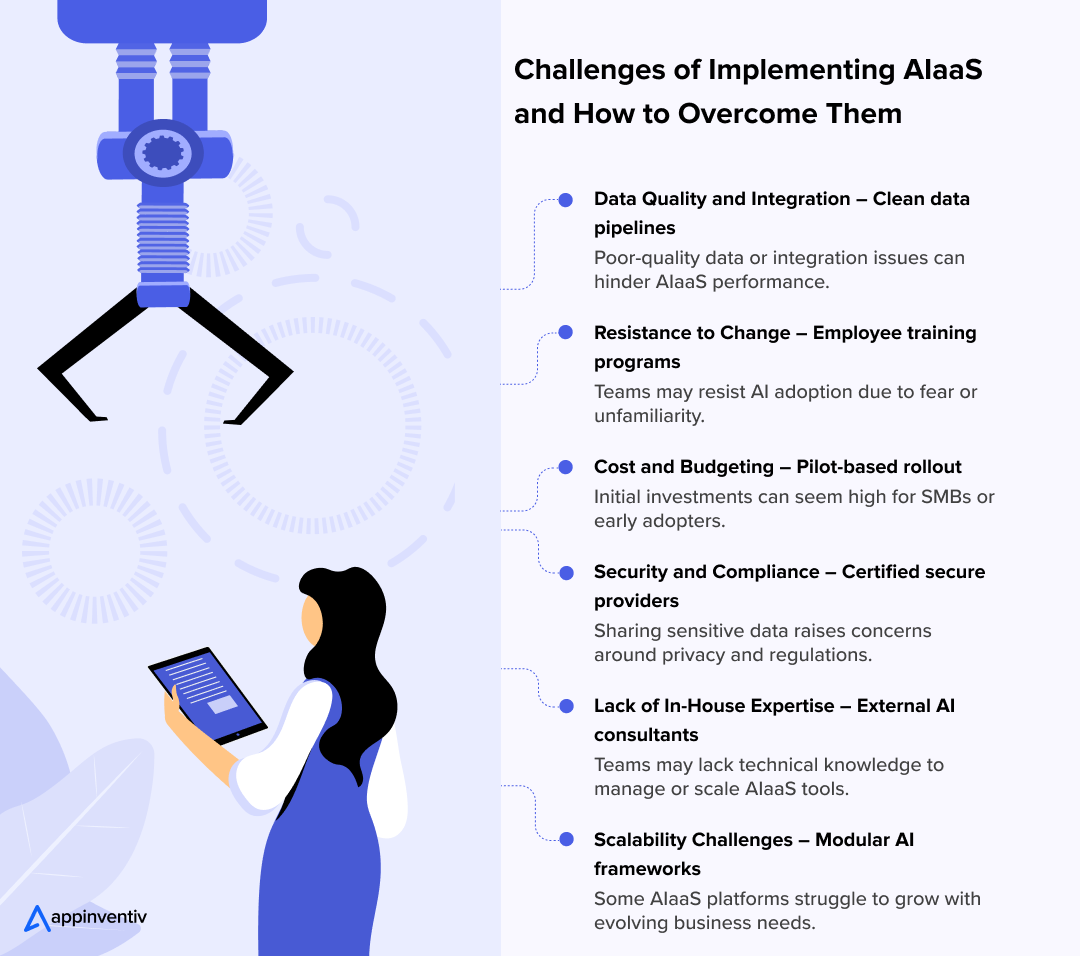
1. Data Quality and Integration
AIaaS only works as well as the data you feed it, and when that data is messy or inconsistent, you’re going to run into problems. Plus, getting AIaaS to play nice with the systems you already have running can be trickier than expected.
Solution: Clean and organize your data before integrating AIaaS. Work with your AIaaS provider to ensure seamless integration with current systems, ensuring smooth data flow.
2. Resistance to Change
Your employees might not be thrilled about bringing AI as a Service into the workplace. Some worry about losing their jobs, while others just find it overwhelming to learn completely new ways of doing things.
Solution: Provide proper training and communicate the benefits of AIaaS clearly to employees. Show them how AI can enhance their roles and reduce repetitive tasks.
3. Cost and Budgeting
Even though AIaaS can save you money down the road, that upfront investment can feel pretty steep, especially if you’re running a smaller business where every dollar counts.
Solution: Start with a pilot project to test the waters and demonstrate ROI before scaling. This minimizes risk while proving AIaaS’ value.
4. Security and Compliance
When you’re using artificial intelligence as a service, you’re essentially handing over sensitive information to outside companies, which naturally makes people nervous about data security and whether you’re still meeting all those regulations like GDPR or HIPAA.
Solution: Choose an AIaaS provider with robust security measures and compliance certifications. Ensure that all data handling processes are secure and meet regulatory standards.
5. Lack of In-House Expertise
A lot of companies simply don’t have the tech-savvy people on staff who know how to handle AIaaS properly, which can lead to poor implementation or not getting the results you’re hoping for.
Solution: To solve one of these challenges of AIaaS, you can partner with experienced AIaaS providers or consultants like Appinventiv who can guide you through the setup and ensure your team receives proper training.
6. Scalability Challenges
Sometimes AIaaS solutions hit a wall when your business starts growing or your needs shift in ways you didn’t anticipate, leaving you stuck with systems that can’t keep up.
Solution: Choose AIaaS solutions that are designed to grow with your business. Regularly evaluate the scalability of your AI systems to ensure they meet future demands.
Emerging Trends in AIaaS: What’s Next for Businesses?
AIaaS is continuously evolving, and staying on top of the latest trends can help businesses harness the full potential of this technology. Here are some key trends shaping the future of AIaaS:
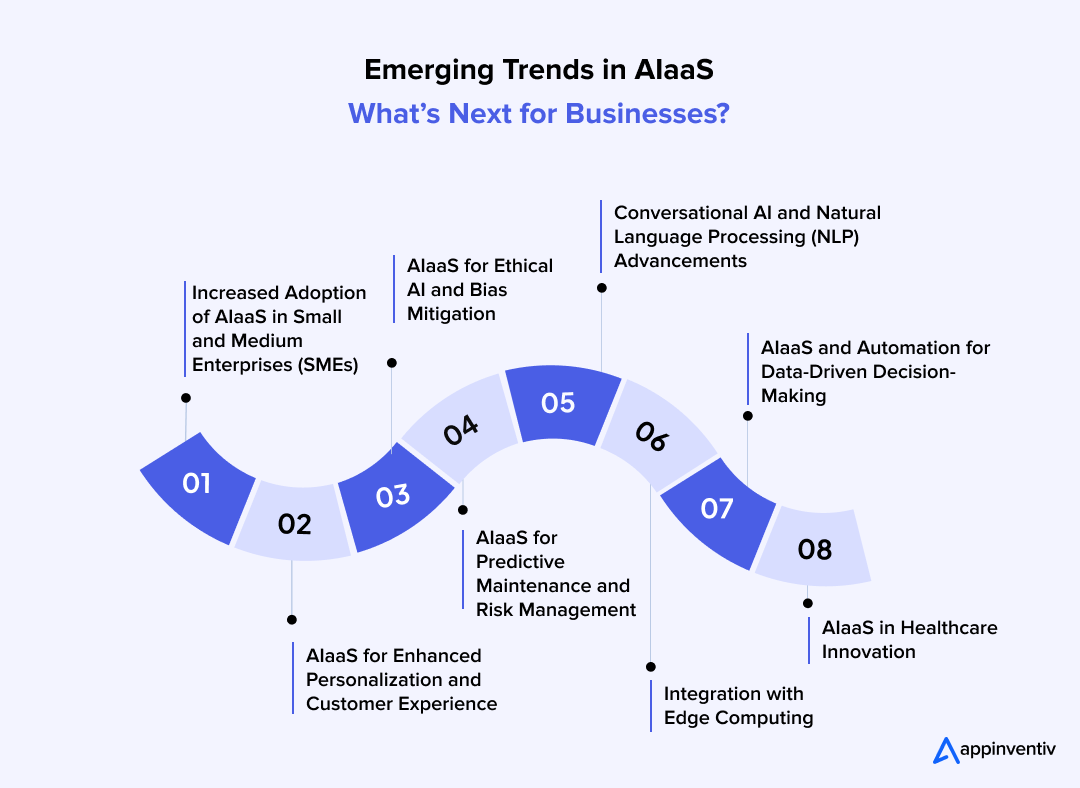 Here’s your content rewritten to reduce AI detection while preserving all keywords, intent, tone, and formatting:
Here’s your content rewritten to reduce AI detection while preserving all keywords, intent, tone, and formatting:
1. Increased Adoption of AIaaS in Small and Medium Enterprises (SMEs)
Big corporations have been riding the AIaaS wave for years, but now smaller and medium-sized companies are jumping in too, realizing they can actually compete on a more level playing field. Since AIaaS has gotten way more affordable and user-friendly, these smaller businesses are using it to handle routine tasks automatically, fine-tune their marketing approaches, and make smarter choices based on real data.
Why It Matters: This whole democratization thing means smaller businesses can actually innovate and go head-to-head with the big guys without having to shell out massive amounts of money to build their own AI systems from the ground up.
2. AIaaS for Enhanced Personalization and Customer Experience
AI as a Service is helping companies create incredibly personalized experiences for tons of customers all at once. Thanks to some serious improvements in machine learning and natural language processing, AIaaS is making recommendation engines smarter, customer service chatbots more helpful, and content delivery more dynamic. These AI tools are getting scary good at figuring out what customers will do next, which means businesses can deliver exactly what people want, right when they want it.
Why It Matters: When you nail personalization, customers stick around longer, feel happier about their experience, and spend more money. Companies that can customize their offerings based on what their customer data tells them will leave their competition in the dust.
3. Integration with Edge Computing
Edge computing is really picking up steam as businesses want to crunch their data right where it’s created instead of sending everything to the cloud first. When AIaaS teams up with edge computing, you get much faster, more efficient data processing without being completely dependent on cloud connections. This is huge for industries like manufacturing, retail, and healthcare where you need answers from your data immediately, not in a few seconds.
Why It Matters: Processing data right on-site means less waiting around, better decision-making, and smoother operations overall, while still getting all the benefits of cloud-based AI that can grow with your business.
4. AIaaS for Predictive Maintenance and Risk Management
Predictive maintenance has become one of the biggest game-changers for AIaaS, especially in manufacturing, automotive, and logistics. AIaaS for business automation improves efficiency by predicting failures before they occur. With this capability, companies can actually see equipment failures coming before they happen and know exactly when maintenance needs to be done, which cuts down on those unexpected shutdowns that cost serious money. On top of that, AI is becoming a major player in risk management by digging through data and spotting potential problems before they blow up into bigger issues.
Why It Matters: Predictive maintenance puts real money back in your pocket by reducing downtime and making your equipment last longer, while predictive risk management helps you avoid financial disasters and protects what your company has worked hard to build.
5. AIaaS for Ethical AI and Bias Mitigation
As AI gets woven into more and more business processes, people are getting increasingly concerned about whether these systems are fair, unbiased, and ethical. AIaaS providers are responding by putting serious effort into making their systems more transparent and ensuring their AI models treat everyone fairly and ethically. Companies are feeling the heat to make sure their AI systems meet ethical standards, especially when they’re handling customer information or making decisions that affect people’s lives.
Why It Matters: Ethical AI isn’t just about doing the right thing—it’s about keeping your customers’ trust and staying out of legal trouble. Companies that put money into ethical AI will dodge legal headaches and build much stronger relationships with their customers.
Also Read: Responsible AI – Addressing Adoption Challenges With Guiding Principles and Strategies
6. Conversational AI and Natural Language Processing (NLP) Advancements
NLP technologies in AI platform as a Service are moving at breakneck speed, giving businesses the ability to deploy much more sophisticated chatbots, virtual assistants, and automated customer support systems. With these advances in AI-powered NLP, chatbots can actually understand complicated questions and respond with remarkable accuracy, giving customers interactions that feel genuinely human.
Why It Matters: When you bring advanced conversational AI into your customer service mix, you’re looking at better efficiency, shorter wait times, and customers who actually enjoy the experience.
7. AIaaS and Automation for Data-Driven Decision-Making
The growing trend of AI as a Service for business lies in automation and intelligent decision-making. Companies are using machine learning algorithms to spot patterns and make predictions that actually guide their business decisions. AIaaS is also making supply chain management, human resources, and financial planning run much more smoothly.
Why It Matters: AI-powered business intelligence as a service enables data-led decisions without manual effort. This means companies can make decisions faster and with better accuracy, leading to higher productivity, money saved, and a much stronger position against their competitors.
8. AIaaS in Healthcare Innovation
AI as a Service is absolutely transforming healthcare by helping doctors make more accurate diagnoses, creating personalized treatment plans, and improving what happens to patients overall. From using predictive analytics to prevent diseases before they start to AI-powered tools that monitor patients in real-time, the possibilities for AI in healthcare seem endless. As more healthcare organizations embrace AIaaS, we’re going to see incredible breakthroughs in personalized medicine, drug discovery, and telemedicine.
Why It Matters: AIaaS in healthcare is making patients healthier while cutting costs at the same time. Businesses that invest in AIaaS for healthcare will stay ahead of the innovation curve and get much better at providing care that actually delivers value.
The future isn’t waiting—and neither should you. Whether it’s hyper-personalization, predictive analytics, or edge-powered AI, we help businesses like yours turn today’s trends into tomorrow’s competitive advantage.
Why Choose Appinventiv as Your AIaaS Development Partner
We hope this blog has helped you understand the powerful potential of AI as a Service and how it can transform your business. If you’re ready to take the next step, Appinventiv is the ideal partner to help you implement AIaaS solutions.
Here’s why we are the right AI services and solutions partner for your business:
- Industry Expertise: With experience across multiple sectors like healthcare, finance, and retail, we understand your unique business challenges and can tailor AIaaS solutions accordingly.
- End-to-End Services: From AI strategy development and implementation to seamless integration and ongoing support, we offer comprehensive AIaaS services to ensure success at every stage.
- Scalable Solutions: We design AIaaS solutions that grow with your business, adapting to changing needs and ensuring long-term value.
- Proven Track Record: As a leading AI development services firm, we’ve successfully helped businesses automate processes, reduce costs, and improve decision-making—delivering measurable results.
- Focus on Security: We prioritize the security of your data and ensure compliance with industry regulations, giving you peace of mind while implementing AI solutions.
Ready to unlock the potential of AIaaS? Let Appinventiv guide you through the journey and help you stay ahead of the curve. Contact us today to get started!
FAQs
Q. How does AI as a service work?
A. AIaaS works by providing cloud-based AI solutions for various business functions:
- Cloud deployment: AI capabilities are hosted on the cloud, making them accessible without on-premise hardware.
- Pre-built models: AIaaS providers offer pre-trained machine learning models that businesses can easily integrate.
- Data processing: AIaaS platforms analyze data in real-time, providing insights and automating tasks.
- Continuous improvement: AI models evolve over time by learning from new data, improving their accuracy and efficiency.
Q. What are some of the most common types of AI as a service businesses should know about?
A. The most common types of AI as a service businesses should know include:
- Machine learning as a service (MLaaS): Provides businesses with machine learning models for predictive analytics and data analysis.
- Natural language processing (NLP) as a service: Helps businesses automate text analysis, sentiment analysis, and chatbot functionalities.
- Computer vision as a service: Offers tools to analyze and interpret visual data, used in image recognition and video analysis.
- Robotic process automation (RPA) as a service: Automates repetitive tasks like data entry and processing, enhancing operational efficiency.
- Speech recognition as a service: Converts speech to text, used for voice assistants, transcription, and customer support.
Q. How AI as a service can benefit your business?
A. AIaaS provides businesses with powerful AI capabilities without the need for in-house expertise or infrastructure. The benefits of using AIaaS platforms include:
- Cost savings: Reduce the need for extensive AI development and infrastructure.
- Scalability: Easily scale AI solutions as your business grows.
- Faster implementation: Get AI tools up and running quickly, without long development timelines.
- Improved decision-making: Gain actionable insights from real-time data analytics.
Q. How to integrate AI as a service into business?
A. Integrating AIaaS into your business involves several key steps:
- Assess business needs: Identify which areas will benefit most from AI, such as automation or predictive analytics.
- Choose a Dedicated Firm: Select a reliable AIaaS services and solution provider that aligns with your needs.
- Data integration: Ensure your existing systems can integrate with AIaaS tools.
- Employee training: Train staff to use AI tools effectively for improved productivity.
Q. What is the cost of AI as a service for businesses?
A. The cost of AIaaS for businesses can vary depending on the complexity of the solution, the provider, and the scale of implementation. On average, businesses can expect to spend anywhere from $50,000 to $500,000 annually for AIaaS services, depending on factors such as the number of AI models used, the amount of data processed, and additional customization or support needed. Smaller businesses can also find more affordable, entry-level solutions, while larger enterprises may invest in more advanced or specialized AI tools. The flexibility of AIaaS allows businesses to scale their costs based on their specific needs and growth.


- In just 2 mins you will get a response
- Your idea is 100% protected by our Non Disclosure Agreement.
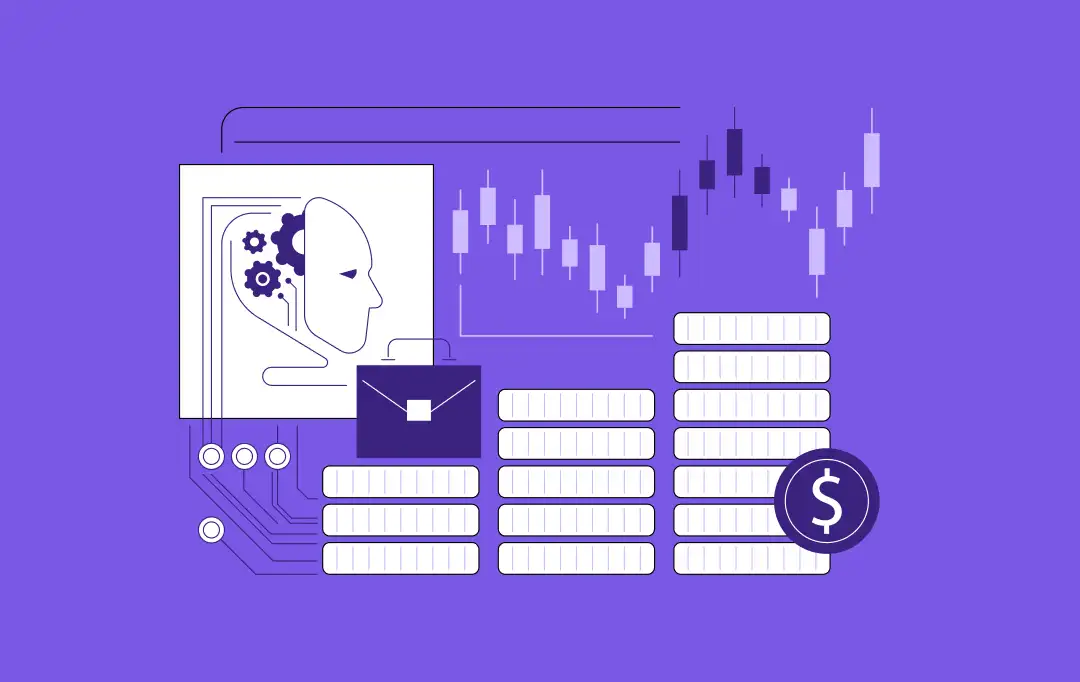
Key takeaways: AI reconciliation for enterprise finance is helping finance teams maintain control despite growing transaction complexity. AI-powered financial reconciliation solutions surfaces mismatches early, improving visibility and reducing close-cycle pressure. Hybrid reconciliation logic combining rules and AI improves accuracy while preserving audit transparency. Real-time financial reconciliation strengthens compliance readiness and reduces manual intervention. Successful adoption…

How to Develop an AI Chatbot for Education Platforms in UAE: Architecture, Cost, and Timeline
Key Takeaways AI chatbots are helping UAE institutions handle repetitive queries, reduce response delays, and improve the availability of student support. Bilingual capability, PDPL compliance, and integration with LMS and student systems are essential for successful deployment. Costs typically range from AED 150,000 to AED 1.47M ($40K–$400K), depending on integrations, personalization, and language support. AI-powered…
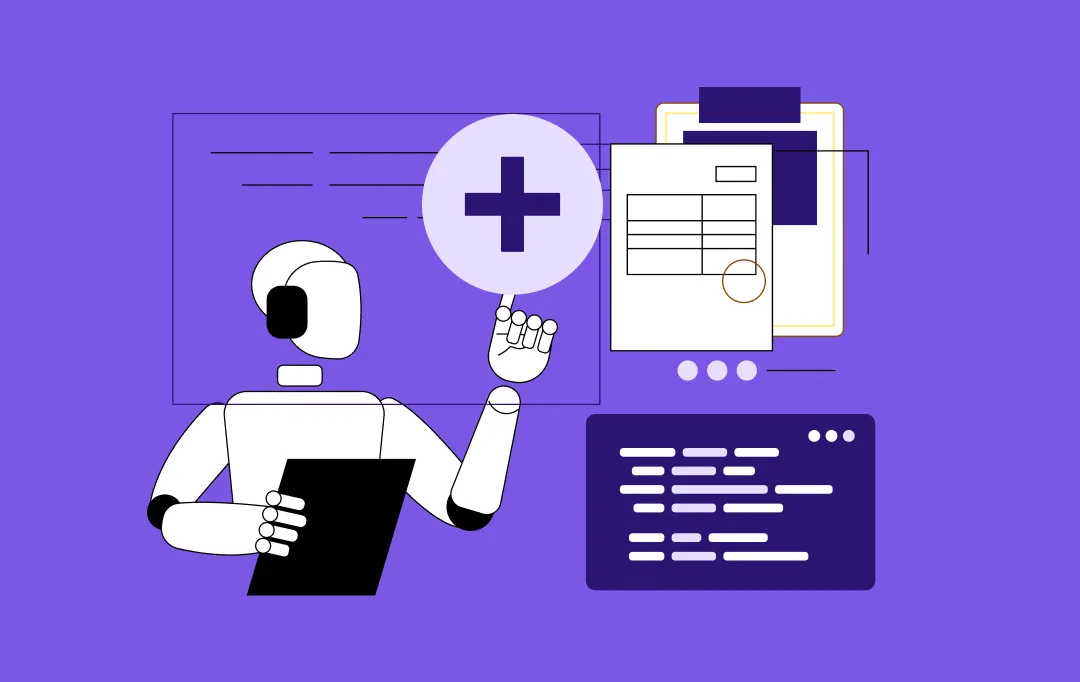
How AI in Healthcare Administration Cut Staff Workload by 40%
Key takeaways: AI automates claims, scheduling, intake, and documentation, cutting repetitive work and freeing staff to focus on oversight and patient coordination. AI validation tools flag incomplete records before submission, reduce avoidable denials by 10–20%, and improve clean-claim performance, enhancing revenue predictability. EHR and note-processing AI reclaim thousands of staff hours in large health systems,…

























